New Institute for NanoSystems Innovation in Boston and Oakland

The Institute for NanoSystems Innovation, a first-of-its-kind research institute located on both U.S. coasts, is developing nano-scale technologies to drive innovation and miniaturization of chip-level technology advancements and applications. ECE Professor Matteo Rinaldi is the institute’s director and ECE Professor David Horsley is deputy director.
This article originally appeared on Northeastern Global News. It was published by Noah Lloyd. Main photo: A computer chip handled in Matteo Rinaldi’s lab. Photo by Matthew Modoono/Northeastern University.
Bicoastal Institute for NanoSystems Innovation launches at Northeastern University
A medical device that can help determine if you have cancer, but can fit on the pad of a fingertip. Miniaturized radio frequency devices to enable 5G technology and beyond. Wearable sensors and implantable technology. Quantum computing.
These are just some of the futures made possible by nanotechnology — technology measured on the scale of a nanometer, one-billionth of a meter.
Now, Northeastern University is launching the first-of-its-kind Institute for NanoSystems Innovation (NanoSI), straddling both coasts of the United States.
NanoSI is co-directed by David Horsley and Matteo Rinaldi, both professors of electrical and computer engineering (and who, earlier this month, received the 2024 Global Network Accelerator Award).
 |  |  |
 |  |
Clockwise from top left: David Luzzi, senior vice provost for research; Professors Matteo Rinaldi and David Horsley address the launch event; David Horsley; a scene from the event; Matteo Rinaldi. Photos by Matthew Modoono/Northeastern University.
‘A serious investment’
At a launch event on the Boston campus Friday morning, David Luzzi, senior vice provost for research and vice president of the Innovation Campus in Burlington, Massachusetts, described NanoSI as “a serious investment of the university, and it’s really built around things that are truly inspiring.”
“The first is great leadership talent,” he continued, gesturing to Horsley and Rinaldi. “The second thing is that these leaders had a vision that dates back” to the Northeastern University SMART Center, which Rinaldi directs. Rinaldi “built the plane while it was flying,” Luzzi said.
Nano-scale systems are by nature very, very small. To put “one-billionth of a meter” in perspective, a strand of human hair is between 80,000 and 10,000 nanometers wide, while a strand of human DNA is only 2.5 nanometers wide, according to the National Nanotechnology Initiative.
NanoSI will develop technologies on this scale, driving innovation and miniaturization across a wide range of functions. They aim to reshape “the landscape of chip-level technology advancements and applications,” the organization writes.
Rinaldi, director of the new institute, noted how this is likely “the first academic institute in the country focusing on semiconductors that is bi-coastal,” thanks to “the global university system that has been built here at Northeastern.”
“Semiconductors,” he also noted, are the “brains and senses of modern electronics.”
Horsley, deputy director of the institute, was visiting Boston from Northeastern’s campus in Oakland, California. He described his excitement for a “new facility that’s coming online in Oakland,” as well as new faculty hiring with specialties in microsystems engineering.
Horsley also pointed to the fact that NanoSI is now the largest center for micro-electromechanical systems (MEMS) research in the United States.
NanoSI will feature a spread of experience, from established researchers with decades of experience to young faculty getting established in — and disrupting — their field. “When you engage with us,” Horsley said, gesturing to himself and Rinaldi, “you also get those people who are early in their career and devoted 100% to their research.”
Read full story at Northeastern Global News